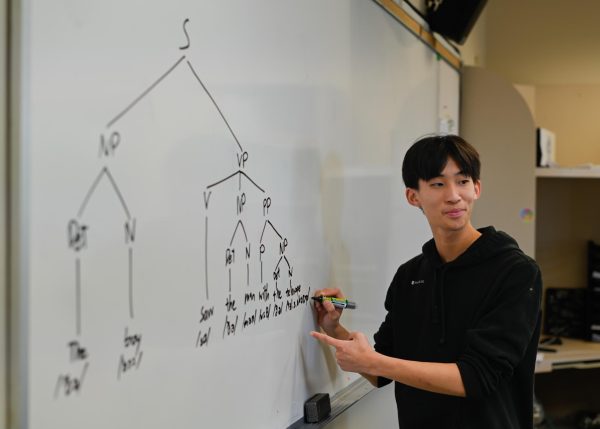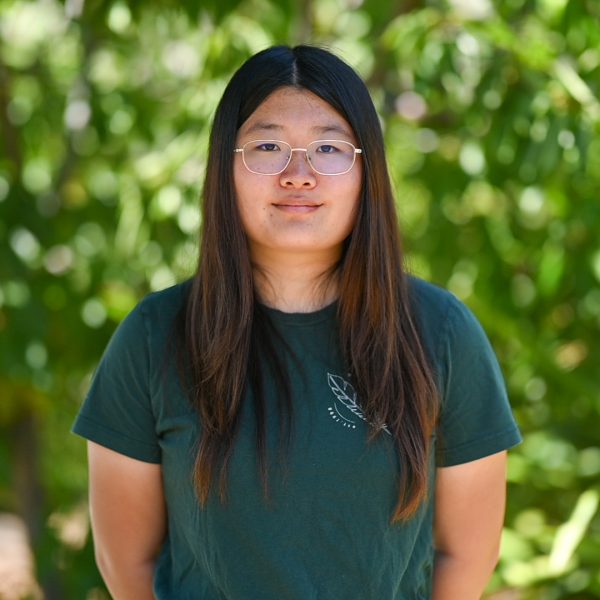
A video begins to play, showing senior Harrison Chen standing in front of a lab table scattered with wires, burettes and beakers. He moves methodically as he adjusts the equipment, guiding the viewer through connecting the wires to the conductivity meter. With a steady hand, he begins the titration, drop by drop, letting the solution fall into the beaker. The burette is placed over the drop counter, its light blinking for every drop that passes through. As the experiment concludes, so does the instructional video, filmed as a reference for future Analytical Chemistry students.
Since he had an extra semester class in his sophomore year, Harrison decided to take the analytical chemistry course taught by former chemistry teacher Robbie Korin to learn more about the subject, despite it being a course usually reserved for juniors and seniors. He enjoyed the lab-based nature of the course, something that he wanted to preserve when chemistry teacher Ran Tao started teaching the class after Korin’s departure.
“I met with Dr. Tao a couple of times, explained how the curriculum and equipment worked and what labs we did,” Harrison said. “I tried to emphasize the exploratory part of class and keep the identity of the class the same. I helped Dr. Tao with starting to teach things, picking which topics to teach that would be interesting and giving her feedback I heard from other students.”
Harrison’s love for both structured analysis and exploration is evident — whether studying chemical reactions in the lab or unraveling the grammatical intricacies of language, he finds joy in understanding the foundations. As linguistics club president, Harrison enjoys guiding members in their own studies such topics, through problem-solving activities.
“You’re going down to the smallest building blocks of a language, like the words and the sentences,” Harrison said. “What makes up a word? How do you put the words together to make up an idea? I really like the part of assigning rules to words, giving it logic and structure.”
To Harrison, learning how language works on a deeper level is fascinating, especially the patterns and structures that often remain hidden beneath everyday conversation. He finds that he can apply his discoveries in linguistics to his life, from morphosyntax in English to programming languages.
“It’s not my goal to connect everything I do, but it happens naturally,” Harrison said. “For example, I learned the International Phonetic Alphabet in linguistics, and then applied it to choir when working on vowel sounds. A lot of what I learned was very applicable in my compilers and interpreters class with programming languages.”
Even though Harrison had no prior singing experience, he joined Rhapsody in his junior year and quickly noticed the connections between linguists and choir. While choir initially represented a way to try something new, Harrison now enjoys learning new skills like harmonizing with others and taking a more logical approach to specific singing techniques. This year, Harrison auditioned for and joined Capriccio, a new ensemble led by music teacher Susan Nace.
“The coolest thing for me to do in choir in terms of singing is creating harmonies,” Harrison said. “Ms. Nace really likes focusing on technique and getting things very perfect, and it sounds really cool when singers make that perfect mathematical blend of wavelengths. I really like the process of singing and matching notes and vowels.”
Rather than pushing for sudden improvement in his singing abilities, Harrison takes an exploratory approach, instead focusing on immersing himself in the music and enjoying time with other choir members. He finds joy in the journey and aims to grow with each practice.
“It was always about having fun with my friends. There was never a period I had to stress,” Harrison said. “I love practicing singing the songs in the shower or in the car, so it’s never really been about the work or the challenge, instead more about the process.”
Close friend senior Nelson Gou, who joined Rhapsody with Harrison last year, observes how Harrison follows his passions without concern for external pressures. He admires how Harrison wholeheartedly dedicates himself to expanding his knowledge.
“My first impression of him was that all the things that he did were passion-based,” Nelson said. “That’s still true. He’s not really doing anything for college or other things. He’s doing them because he purely enjoys them. That’s something I really look up to about him.”
Computer science teacher Anu Datar, who taught Harrison in his frosh and junior year, notes his exceptional analytical skills. She commends how easily he managed the material despite having no prior experience, later even going on to take advanced topics courses such as Compilers and Interpreters.
“He has a natural aptitude for linguistics, problem-solving and algorithmic solving,” Datar said. “His analytical abilities are on a completely different plane. Sometimes when he’s speaking, he’s getting ahead of himself and skipping a few details because in his mind, he’s already processed it, and it’s difficult for mere mortals around him to get what he’s saying.”
Close friend senior Alicia Ran, who became friends with Harrison during their sophomore year DECA trip, reflects on his approachability when forming relationships. She admires how his genuine and open nature attracts friends who truly appreciate him.
“He makes friends really easily and I admire that about him, especially because he’s so upfront about who he is that most of the friends he makes are the ones he keeps,” Alicia said. “You won’t be friends with him unless you like him for who he is.”
In each of his communities, Harrison feels tied together with his peers by their shared desire to improve and genuine bond over love for their craft. As he did in high school, Harrison hopes to thrive with his enduring love for learning and exploration, always finding ways to apply his many skills.
“After I joined choir, I realized how important a sense of community and belonging is,” Harrison said. “It’s not vital to having a good time in high school. Before that, I was perfectly happy in sophomore year. But joining choir in junior year gave me that sense of working toward a long-term goal together and trying to perfect it and practice it with other people.”


















![“[Building nerf blasters] became this outlet of creativity for me that hasn't been matched by anything else. The process [of] making a build complete to your desire is such a painstakingly difficult process, but I've had to learn from [the skills needed from] soldering to proper painting. There's so many different options for everything, if you think about it, it exists. The best part is [that] if it doesn't exist, you can build it yourself," Ishaan Parate said.](https://harkeraquila.com/wp-content/uploads/2022/08/DSC_8149-900x604.jpg)




![“When I came into high school, I was ready to be a follower. But DECA was a game changer for me. It helped me overcome my fear of public speaking, and it's played such a major role in who I've become today. To be able to successfully lead a chapter of 150 students, an officer team and be one of the upperclassmen I once really admired is something I'm [really] proud of,” Anvitha Tummala ('21) said.](https://harkeraquila.com/wp-content/uploads/2021/07/Screen-Shot-2021-07-25-at-9.50.05-AM-900x594.png)







![“I think getting up in the morning and having a sense of purpose [is exciting]. I think without a certain amount of drive, life is kind of obsolete and mundane, and I think having that every single day is what makes each day unique and kind of makes life exciting,” Neymika Jain (12) said.](https://harkeraquila.com/wp-content/uploads/2017/06/Screen-Shot-2017-06-03-at-4.54.16-PM.png)








![“My slogan is ‘slow feet, don’t eat, and I’m hungry.’ You need to run fast to get where you are–you aren't going to get those championships if you aren't fast,” Angel Cervantes (12) said. “I want to do well in school on my tests and in track and win championships for my team. I live by that, [and] I can do that anywhere: in the classroom or on the field.”](https://harkeraquila.com/wp-content/uploads/2018/06/DSC5146-900x601.jpg)
![“[Volleyball has] taught me how to fall correctly, and another thing it taught is that you don’t have to be the best at something to be good at it. If you just hit the ball in a smart way, then it still scores points and you’re good at it. You could be a background player and still make a much bigger impact on the team than you would think,” Anya Gert (’20) said.](https://harkeraquila.com/wp-content/uploads/2020/06/AnnaGert_JinTuan_HoHPhotoEdited-600x900.jpeg)

![“I'm not nearly there yet, but [my confidence has] definitely been getting better since I was pretty shy and timid coming into Harker my freshman year. I know that there's a lot of people that are really confident in what they do, and I really admire them. Everyone's so driven and that has really pushed me to kind of try to find my own place in high school and be more confident,” Alyssa Huang (’20) said.](https://harkeraquila.com/wp-content/uploads/2020/06/AlyssaHuang_EmilyChen_HoHPhoto-900x749.jpeg)




Mokuroh • May 7, 2025 at 4:59 pm
This guy is actually the coolest :>